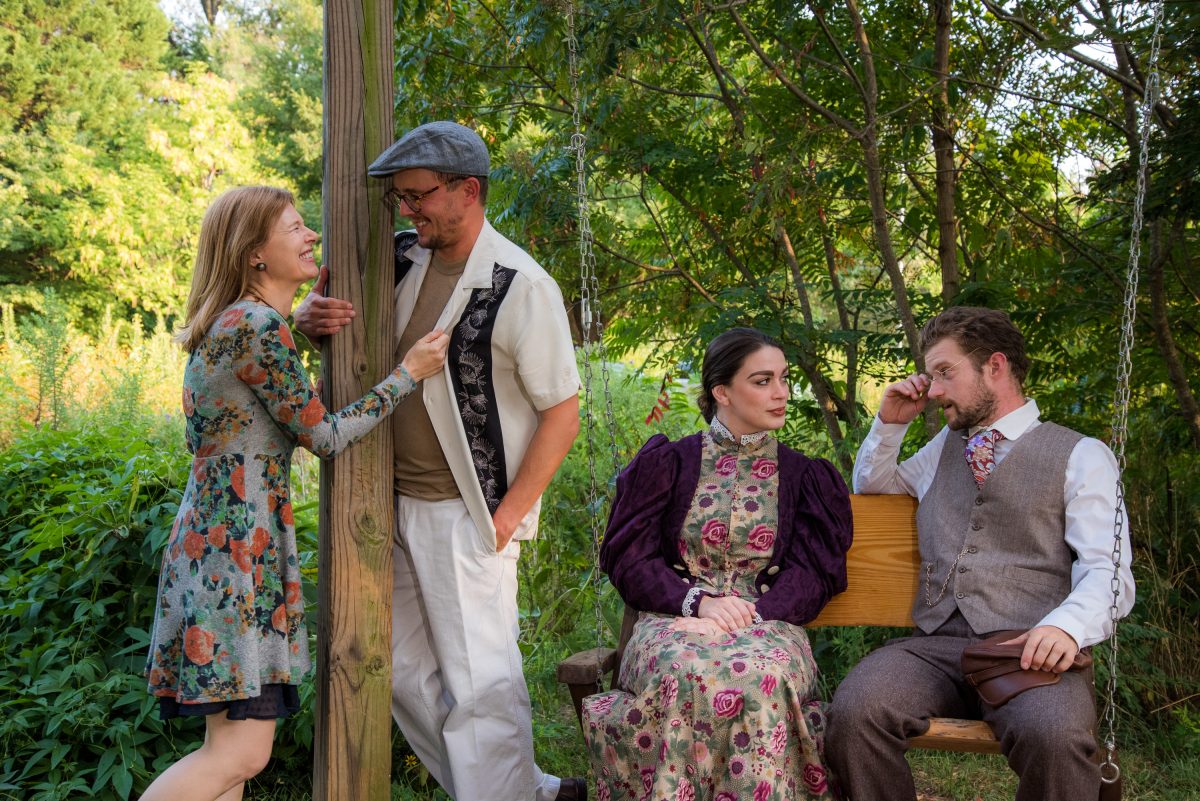The theme of Anton Chekhov’s 1898 play Uncle Vanya is captured by two words in the title of Aaron Posner’s 2015 adaptation: life sucks.
That message won’t have audiences leaving the theater downhearted, however, when Live Arts kicks off its 33rd season with a concurrent run of Uncle Vanya and Life Sucks.
Even if the journey of life is sometimes a slog for the characters in Chekhov’s and Posner’s plays, they learn to get as much out of the trek as they can. “It should not leave people with a heaviness,” says Live Arts Artistic Director Susan E. Evans, who directs Uncle Vanya. “It should leave people thinking, but not feeling that life sucks. Life Sucks is tongue-in-cheek, even the title.”
A Chekhov fan since she was a teenager who related to Three Sisters, Evans noticed a lack of the Russian playwright in Live Arts’ repertoire and decided to change it. In order to help Charlottesville audiences connect with a show originally meant to resonate with Russians in another era, Evans is running the classic play in repertory with a living American playwright’s comic take on it.
“We’ve had feedback from the community about definitely wanting classics in the mix,” Evans says. “To me, this is a nice way of making connections between a contemporary playwright who’s actually right next door, because he’s based in D.C., and also being able to present a classic I love.”
While Evans helms Uncle Vanya, Fran Smith, co-founder of Live Arts, is returning after a three-year hiatus to direct Life Sucks. After directing more than 60 shows at the theater since its founding in 1990, she says this production “might be my swan song.”
“I’ve been waiting to do one more, and I just really love Life Sucks,” Smith says. “It’s about love, longing, and loss, but it’s also about hope. I think people will relate to it.”
Uncle Vanya takes place in an estate in the Russian countryside, where a group of people lament lust, unfulfillment, and ennui as strained relationship dynamics and arguments over the management of the estate threaten to disturb the boredom of everyday life. Life Sucks surrounds a similar gathering of seven people in the United States, 126 years later.
Running these plays at the same time presented a challenge for scenic designer Tom Bloom, associate professor emeritus of scenic design in the UVA Department of Drama, who was tasked with designing one set for two shows taking place over a century apart.
Audience members who come to the Founders Theater on consecutive nights this fall will notice a pair of different settings on the same stage. Uncle Vanya takes place in period-specific costume on a porch, and includes a working swing and real trees. In contrast, Life Sucks focuses on its actors as they revolve around a spare stage that features just a table, two chairs, and a stairway.
Like the foundation of their sets, the bedrock of the plots in Uncle Vanya and Life Sucks are recognizably similar, but distinguished by embellishments, such as the Chekhov character who shows up as a puppet in Posner’s adaptation. Where a missed gunshot causes panic and fury in Uncle Vanya, it leads to mockery of the shooter in Life Sucks. Where one character soliloquizes on her loneliness in Uncle Vanya, she turns to the audience and asks for a show of hands as to who wants to sleep with her in Life Sucks.
“That’s the thing I love about Posner,” says Smith. “He’ll take a situation that could be very intense and serious, and make it funny.” As talks of estate management and deforestation in Uncle Vanya turn into characters lamenting student loans and climate change in Life Sucks, the two shows remain connected by similarities that run deeper than the ever-present drinking of vodka. Both plays challenge their actors, thanks to Chekhov’s disinclination to define characters as good or bad. He similarly does not make a judgment about the overall mood of Uncle Vanya, which is labeled as neither tragedy nor comedy, but rather as “scenes from country life.”
Although that country life takes place in a distant location and time, many of the problems the characters face in Uncle Vanya, from unhappy relationships to environmental destruction, remain surprisingly relatable to 2023 audiences. “It’s very accessible,” Evans says. “It’s like a midlife crisis play, in a way, and a lot of us can identify with that.” Posner then takes those conflicts and makes them instantly recognizable through Life Sucks’ seven characters, who grapple with timeless issues, like the fear of aging you feel when you find a gray nose hair.
“Everybody in the audience can relate to one of these characters,” Smith says. “That’s what I find really fun about this show. It doesn’t need a lot. It really relies on the actors to carry it.”
